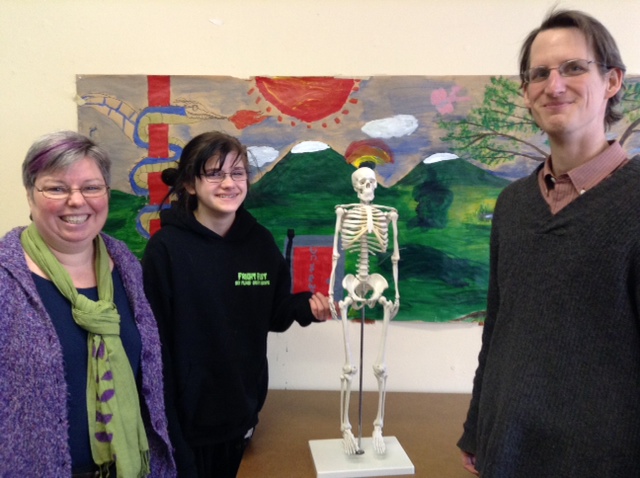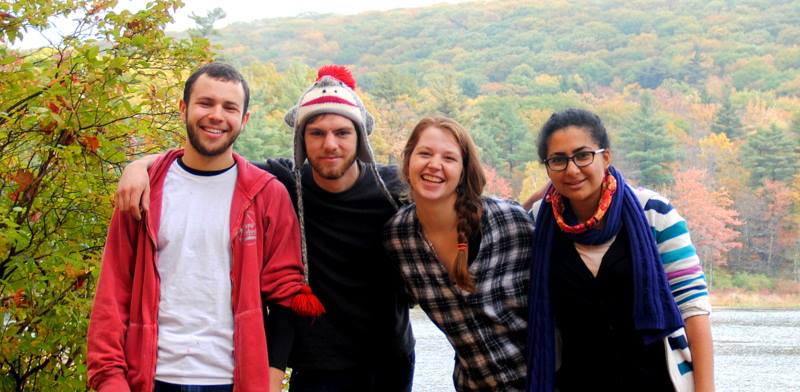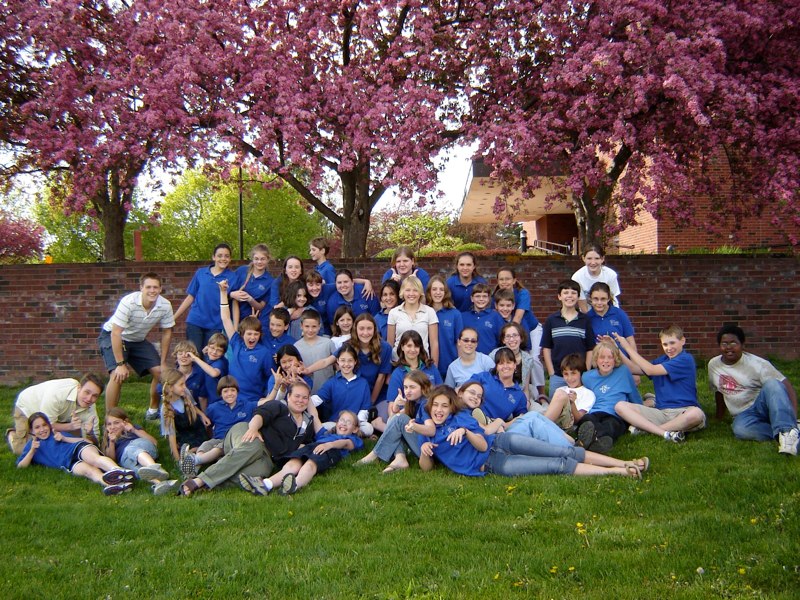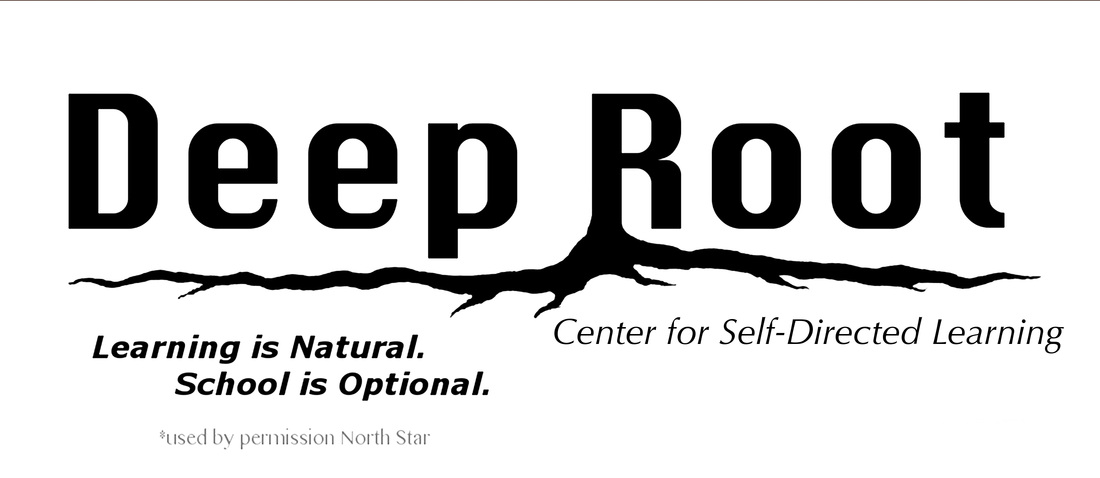 Flexibility along with the ability to move quickly was listed as number five on our recent Top Ten list. I did not contemplate the arrangement of each point as I was composing that post; it is written in the order that they occurred to me. I would, however, upon thinking back, place this particular strength closer to number two or three. Our willingness, openness and dedication to view nearly anything as education and our ability to provide possibilities for each kid who walks through our doors is what sets us apart from any other learning institution in the North Country. When a student tells me he wants to learn something, I delight in connecting him to that person or opportunity in our community that will allow him to pursue his interest. Because, his passion for a particular subject is the driving force behind his engagement and desire to learn. I would like to, if you would indulge me, provide a few examples from the past few weeks. One of our email subscribers has an eight year old daughter. She contacted me after reading one of my posts. Through an extended email exchange, she told me her daughter is passionate about making things and wanted to learn to sew and knit and then asked if I could help. I was delighted to inform her that my first college degree was in Fashion Design. Yes, I could teach sewing and maybe even a bit of design. I also told her I could find someone to teach her to knit. Within an hour, I had contacted a friend who was pleased to offer knitting lessons the following week. To date, this child has spent two days at DRC and has, with her own sewing machine, sewn a bag, a skirt (with fancy train), and vest (with cape). She has had one knitting/crotchet lesson and she created a clay sculpture and dictated a story to go along with it. We are in the process of finishing the story, typing it up, and creating a book. Her next sewing project will probably be a dress from a pattern that I had designed many years ago. A twelve (almost thirteen) year old student joined us about one month ago. She has many interests and talents and this past week told me she would like to become a neurosurgeon. She wants to study anatomy and has started by memorizing the bones in the human skeleton (and she is using our brand new half size human skeleton model donated by Nature's Storehouse). She is currently working on learning the individual names for the carpal and tarsal bones. She is also enrolled in an on-line biology class at SUNY Canton. During one of our first conversations, we were discussing languages and she told me she wanted to learn Arabic. I contacted the Modern Language Department at SLU and within three hours, after making a few connections, had a SLU student who was willing to be her Arabic tutor. She has had three lessons, thus far. Another thirteen year old told me she was sick of doing the on-line math lessons. I asked what she would like to learn and she said basic everyday math. We proceeded to have a fun, lively, and impromptu budgeting class. The two girls took a printed household budget sheet, researched their desired careers (baker and neurosurgeon), including undergraduate and graduate degrees needed, and the salary range. It was fascinating to watch them decide with further research (rent for a one bedroom apartment in Canton, etc) how much they would budget for each life expense. This girl's burning desire, it has been her dream for years, is to open a bakery (her specialty is cupcakes). Our conversation centered around starting a business and whether an apprenticeship or culinary school would be better to learn the business. I am definitely rooting for this kid; Canton needs a good old fashioned bakery! DRC is able to move quickly to provide opportunity because we have no preconceived agenda or defined curriculum and we are not limited by what the staff can teach, because we consider the whole community our extended staff. Each student, with assistance, creates their own program with their own goals; their education is individualized and perfectly suited to them, and it is completely flexible. Student are supported and encouraged to try something new, when they tire of a previous interest. In fact, we offer to meet with each youth weekly, to listen to concerns or requests, offer ideas, and to facilitate any change the student desires. These particular kids at the ages of eight, twelve, and thirteen are living their dreams, now. They may not end up working as a seamstress, neurosurgeon, or baker, but they are happily engaged in creating intentions, following their interests, practicing life skills, and learning how to learn. They are each directing their own education and are exploring all of the possibilities with help from DRC.
0 Comments
 I do like green eggs and ham Sam I am! I do like green eggs and ham Sam I am! Humans are fairly perverse creatures. We seem to operate best when we are challenged or told we can't or shouldn't do something. Truth or Dare continues to be one of the most popular tween and teen party games. I am sure there are multiple variations since I was a member of that esteemed age group, but the illicit or secretive nature of these games is still the draw or incentive to play them. Humans quite simply love challenges; we plainly delight in proving other people wrong. Theodore Geisel, the beloved Dr. Suess, wrote The Cat and the Hat using only two hundred and twenty different words. After The Cat and the Hat was published it became an instant best seller because it offered, in an appropriate and interesting story, basic words for children who were learning to read. Geisel's publisher bet him, fifty dollars cash, that he could not write a book using only fifty different words. A few years later, Green Eggs and Ham, a book with exactly fifty distinct words, was published and Sam I am became a household name for generations of children. Dr. Suess went on to write many more classics; I wonder if the betcha can't in this instance, may have been one of the most influential wagers in the history of the written word. Sugata Mitra, the 2013 Ted Talk winner, takes another approach with similar results. His challenge is indirect, however, decidedly intentional. In fact, he uses the word pedagogy to explain his methods in the Hole in the Wall experiments in India (If you have not watched his Ted Talk, it is well worth your time. He will also be keynoting the May 2015 AERO conference on Long Island. Sadly, I will not be attending.) Mitra placed computers in a wall in the slums of India and watched children teach themselves how to use them. Yes, he is a teacher; nevertheless, he does not stand or hover over children to direct their learning experiences, he lets them discover everything on their own. When the children ask him how something works, he says in his bumbling way, “I really don't have the foggiest.” And then stands back (actually leaves) and watches them figure everything out as a group, by teaching each other. After setting up several different Hole in the Wall experiments, over many years (with scientifically recorded and replicated data) all over India, he has determined that children learn when they are interested and when they are offered these oblique challenges. In some instances, these overtly poor kids taught themselves English so they could figure out how to use the software and how to browse the Internet. We humans do indeed savor a challenge! I am not at all surprised that interest, passion, and need to be contrary drives all of us to learn, or be creative. I would strenuously argue that these are all the essential building blocks for self-motivation and yes, self-directed learning. We gravitate, as human-beings (as do most primates), to those things that offer excitement, fun, a level of difficulty, and enjoyment. Our culturally accepted educational methods or pedagogy, plainly stated, are destroying the very desire to learn. Instead of challenging students, we provide them the complete opposite by spoon feeding them information, rules, and activities, so they can complete the tasks we deem essential. When they do get a few minutes to themselves, they often choose to disconnect and relax with passive entertainment. Which results in direct feedback about being lazy and unmotivated. It is a vicious cycle. Many youth do not have intrinsic motivation because they have been externally stimulated their whole lives. But yet, we expect them to take initiative and make good decisions when they arrive at college or enter the workforce. I present the following challenge to all parents, teachers, care-givers, tutors, after-school volunteers, or for that matter, anyone who interacts with children in anyway. The next time a child asks you a question, I betcha will find it hard to step back, shrug and say pensively, “hmmm, I'm not really sure… ” Try it, and I wager that once you are truly able to get out of the way, you too will be addicted to offering the magic of personal discovery that brings the awesome light of pure satisfaction, delight, and joy to a child's face.  Ian, on a camping trip last fall Ian, on a camping trip last fall This is a guest post written by my son Ian, who has made various appearances as a recurring character in this blog, most recently as the kid with the sleep disorder and aversion to tests. Ian is currently a third year student at Hampshire College in Amherst, MA and is in the process of formulating or designing his Div lll project which is the culmination of a Hampshire education. Enjoy this brief respite from my lengthy ramblings. As a student, everything in my life starts with printer paper. Take yesterday, for example. Upon realizing that both my primary file cabinet and backup cardboard box had reached maximum capacity and were spewing six months of assorted paper onto my floor, I decided to get my hands dirty and do some recycling. During this process, I found an article assigned two years ago in a class that partially instigated my decision to study history. It was likely saved for the same reason I save everything else—in the moment, my instincts as a historian-in-training told me it might come in handy some day. And so here we are. Validation! Apocalyptically entitled Something Has Gone Very Wrong, this article serves as the introduction to James Loewen’s Lies My Teacher Told Me. This is a book, I have to confess, that I haven’t gotten around to finishing, despite many favorable recommendations. In any case, Loewen illuminates an issue that has been occupying my thoughts throughout my college career—I love learning history, but so many of my peers seem to actively despise it. As he writes: “High School students hate history. When they list their favorite subjects, history invariably comes in last. Students consider history ‘the most irrelevant’ of twenty-one subjects commonly taught in high school. Bor-r-ring is the adjective they apply to it…Even when they are forced to take classes in history, they repress what they learn, so every year or two another study decries what our seventeen-year-olds don’t know” (1). I study history—communication in medieval Europe, if we’re being specific. While I’m not sure about most things, I am fairly certain that I don’t find history boring. It is frightening, to say the least, to think that such an outlook is the norm. I mean, lets face it: topics like political intrigue and war are exciting. How is it possible that the past, rife with drama and suspense, strong characters and plot twists, is so often reduced to the kind of banal material that no one can enjoy? The History Channel needs to employ the aid of alien involvement in order to sell history, to make it exciting. Something is wrong with this picture. Loewen cites poor quality of textbooks as a primary force in the collective hatred for history. His argument is extensive, but there are two points I wish to draw out here: the lack of excitement textbooks incite, as well as the inability of textbooks to make history relevant. To make my personal situation clear: I don’t read textbooks. This isn’t because I refuse to, but rather because textbooks simply aren’t assigned. This isn’t a side effect of going to Hampshire, an emphatically alternative college—indeed, the majority of my history courses have actually been at Smith, Amherst, and UMass Amherst. My professors don’t assign textbooks because they are aware that the alternatives are so much better for everyone involved. Rather than being subjected to a condensed, overtly biased, and flat-out boring summary, I am assigned primary documents. I don’t read a list of bullet points. I read the documents upon which the textbook summary is derived. This is what makes history exciting for me—the notion that I’m reading words written a thousand years ago by someone who was directly involved. My readings of the crusades, for example, are not relayed by a distant and impartial narrator from the 20th century, but rather by those in the thick of medieval battle. As such, reading their accounts is an undeniably meaningful way of engaging with history—the crusades, for obvious reasons, mattered to those involved. Reading these accounts breathes relevancy and excitement back into history. But when it comes down to the wire, when asked to justify or defend my studies—an exceedingly common occurrence—I generally take the honesty track by saying that I love what I learn. Sure, presentation and relevance certainly play a role—I could wax poetic on the necessity of understanding pre-modern ideals in order to make sense of our own present-day situations. Chivalry informs the way in which we justify violence against women; the crusades informs the way in which we justify violence against those different from us. The birth of the medieval judicial system informs our usage of grand juries. Medieval literature informs the tropes and formulae behind Hollywood. The list goes on and on, and I’m more than happy to debate particulars. I am stalwart in my position that history need not be irrelevant and boring. No rational justification, however, trumps the true justification for my studies: I fear that this subject I love will be deemed utterly irrelevant. I am learning history, but I am also learning how to defend history—this is what makes my studies worthwhile. 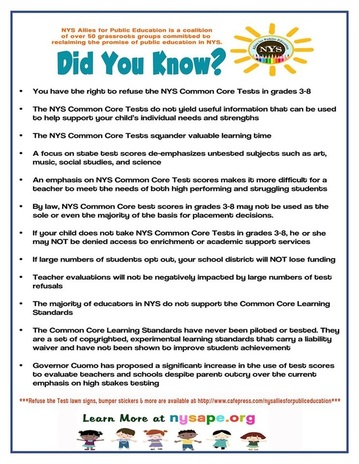 One of the most important and useful tools in any educators toolbox, as I explained in a post celebrating our daughter, MacKenzie, is giving youth the opportunity to say, “no.” That opportunity, however, is completely lacking according to all of the recent hyperbole, subterfuge, and misinformation circulating through the media about a child's and parent's right to refuse the New York State tests. This disregard for the truth is upsetting and frankly dangerous. With that bold statement, I am bound to be accused of hyperbole myself. As you can probably guess, I have a story to go along with this point. When our son, Ian (who will be turning 21 in April) was in first grade, he encountered his first standardized testing experience. I can't remember the specifics, but I do remember that he didn't sleep for over two weeks because he was so completely stressed out about that math test. The same thing happened during the spring of 2nd grade, only this time he didn't sleep well for a month, and 3rd grade was a repeat performance with nightmares for six weeks. Every year, we offered comfort and assurance. We told him there was no reason for him to be anxious, however even at the age of six, he was not going to buy that line. He knew that those test scores held consequences, and of course he was right. They are given weight that is disproportionate to their actual importance. They determine how teachers will interact with each student (depending upon their scores). They are the assessment tools used by the State to rank school districts and determine whether they are failing or not. They are used to assess teachers. They are used for everything that is bureaucratic and for nothing that has anything to do with actual education. They undermine real learning, because they stress the rote memorization of facts and figures instead of celebrating the exploration of the world. Looking back these fifteen years later, I am embarrassed to say, we did not explore our rights as parents. We simply followed the crowd and did what we were told was best for our child. But of course, to borrow a really old and overused cliché, hindsight is always 20-20. I would like to offer the following information for any parent who is questioning whether the tests are good for their child. These facts are from the website New York State Allies for Public Education which has been set up specifically for parents who want to learn their rights around high stakes testing. You can visit the website to download refusal templates and other important information. You and your child can refuse the tests and Deep Root Center can help. Your child can spend those testing days exploring, building, creating and interacting with others in our safe, comfortable, resource filled learning environment. You can contact us directly for more information. An addendum to the above tale includes Ian's continued disdain for standardized tests. He refused to take the SAT s with full knowledge that he was going to choose a college that was test optional, in fact Hampshire, the college he chose is not only test optional, it refuses to accept any standardized test scores, and they go so far as to incorporate this philosophy of no grades and no tests into their daily operations. As a third year student, Ian is thriving. This is a school that leads the way in innovative, creative thinking; instead of choosing majors, students explore their interests and follow them to create an intensive final project in their fourth year. Students are expected to participate fully in their education, it is intensive and highly intellectual. And, they do all this without tests! In the interest of full disclosure, with the National Merit Scholarship as an incentive, as a Junior, Ian did take the PSAT. No, he didn't get it!  As a member of the Liberated Learners network: 10. We embrace the non-compulsory aspect---kids can utilize our facility as often as they want, and we do not take attendance. We are only open four days a week, because young people have real lives, too. 9. We delight in being non-coercive---kids can choose to attend any of the classes from our schedule--- no one has to do anything they are not excited about. Everyone has the right and opportunity to say, “No”. 8. Our staff and volunteers are equals, not authority figures. DRC is a safe, comfortable environment that supports and encourages learning and growth opportunities for everyone. Respect for yourself, for the space, and everyone within this community is the only rule you will find at DRC. 7. Every person, is supported to take charge of their own education. Staff and tutors are not responsible for making sure or dictating educational plans. They simply do not tell youth what to do, or for that matter, what not to do. 6. DRC offers opportunities, possibilities, and options, not strict time-tables, curricula, or subjects. Each student can go at their own pace. They can choose an academically rigorous route at an early age or they can meander and explore every option that comes their way. At DRC there are no should's or have to's--- only could's. 5. The DRC community is flexible and can move quickly when specific topics or interests are requested and/or become available from outside resources. 4. There are no rewards, testing, requirements, or punishment. Simple but profound appreciation and encouragement are offered daily. 3. Each student member has a staff mentor and can choose to be directly connected to the local community through individual tutors, internships or apprenticeships, field trips, and volunteer opportunities. 2. We listen closely. We believe that everyone has a voice that can and should be heard. And, 1. The DRC staff, board and community is open-minded and willing to explore learning opportunities wherever they may pop-op, because we consider the world our classroom. We firmly believe that education should be a conversation not a lecture and are committed to teaching people how to acquire knowledge, how to think creatively and individualistically, and most importantly, how to appreciate their own style and awesomeness. We have distilled this whole list into two simple statements, which just happen to be our mission and tag-line: DRC provides the environment, resources, and support for young people who choose to live and learn without school. Because, learning is natural and school is optional! *** (all of the hyper-linked words or phrases will direct you to previous posts that highlight those particular concepts and points.)***  I firmly contend that education is defined by empowerment and choices, and that all true learning starts with the opportunity to say, “no.” Because without the presence of real options, how do we know when to say, “yes?” This piece, in a very strange way, is a tribute to our phenomenal daughter, MacKenzie, who will turn eighteen, next week, on March 10th. The following is a story that I have imparted before, please bear with me through this repeat telling; I believe it presents insight into the power and possibilities offered by following a child's lead. We learned that a brand new children's choir had been formed at Crane School of Music, when Kenzie, our delightful, headstrong songstress, was six going on seven. She was very excited to sing with a group of children and was completely enthralled with becoming a musician at the time. We contacted the amazing Professor Heather Eyerly, founder of the choir and set up an audition. The interview was scheduled directly before the first rehearsal of the spring semester. Dr. Eyerly asked MacKenzie to stand beside the grand piano and do a few voice exercises. Kenzie complied until the last request to sing “Happy Birthday.” She looked directly at her and very clearly and decisively said,“No.” I am eternally grateful to Heather. She didn't take it personally or get all huffy; she simply ushered Kenzie to her place amongst the other children in the choir. This was a defining opportunity that allowed MacKenzie, at the age of six, to fully explore her interests in music and practice her craft, weekly, with professional musicians for nearly ten years. And to this day, she absolutely adores and idolizes Dr. Eyerly. This instance, as you may have guessed, was neither the first nor last time MacKenzie said, “no” to an authority figure. She was never rude or disrespectful; to be very clear, she was (is) just very confident about her abilities and she was (is) always true to herself. I have to confess there were several times, as her parent, I was mortified and just wanted to sink beneath the floor boards. MacKenzie is, however, a poster child for self-directed/independent learning because of her ability see her life and education as a series of choices. She has always been willing to voice her opinion and stand up for what she believes is just. She is fierce and lovable, empathetic and passionate, loyal and determined. She is quite simply awesome and, whether offered options, or not, is always willing to say “no!”  Deep Root Center has become the educational equivalent to an urgent care facility in St. Lawrence County. We have helped seven kids leave school, in the past few months. Similar to any other crisis situation, when a parent has a child who is exhibiting alarming symptoms such as: resistance to attending school, severe unhappiness with school, physical illness related to attending school, personality changes, or depression they are desperate for help; many families have discovered that Deep Root Center offers prompt, professional, and compassionate assistance to their child's urgent needs. Throughout the country the incidence of social anxiety among young people has risen dramatically. These growing numbers are reflected locally by the sheer number of phone calls and emails DRC receives each week requesting information and/or assistance. Many articles on the Internet blame the symptoms of teen anxiety on the use of social media and technology as a crutch or reason to avoid social interactions. I believe, however, this flourishing phenomenon is actually a direct result of intense and unfriendly classroom environments, high stakes testing, opportunities for cyber bullying, old-fashioned school yard bullying, increased pressure from society, sexualization of girl's clothing choices, extreme competition, and media expectations. Anxiety and stress, for most kids, really is a matter of extreme emergency. They, as a last resort, refuse to attend school because they have often done everything they can think of to express their despair within the system. This of course brings a legal element into play. Strict New York State laws dictate mandatory, compulsory school attendance for children ages 6-16. Schools call parents, threatening intervention by Social Services if the absences continue, everyday the child is not in school. These daily phone calls frequently feel like harassment to the families. Deep Root Center provides a respite from this bombardment. If they choose to homeschool, with or without becoming a member of Deep Root Center, we work directly with them to complete the two initial documents required by New York State to officially leave school. Each family first follows a simple template to write and submit a letter of intent to homeschool to their school superintendent. I then meet with the student (and family) to ascertain their particular interests. This is when I ask those questions that usually get a deer in the headlights response (see, I have to vs. I want to). Kids eventually start presenting ideas after some gentle prodding and encouragement. This process sometimes can take a couple of hours or even a few days. They simply can't believe that they are truly in charge of their education. All of this information is transformed into an IHIP (Individualized Home Instruction Plan); the second mandatory written document that lists all of the required subjects. This essentially becomes each students learning plan. And, I always make a point of explaining to each youth, it is a guideline, an organic, living, breathing document that can be changed. These, however, are only the first steps toward healing. Kids are then offered the chance to decompress, choose their educational path, and take charge of their own learning. This is where the “care” part of “urgent care” comes in to play. Our honest desire to help is communicated through our willingness to listen closely to everything a child says. Our empathetic response helps to build a profound and meaningful relationship with each young person and their family. A student has to feel safe and understood, and then they have to take time to de-school. This means they actually need to take some time off from organized, scheduled learning. It is during this period that they will begin to gain self-awareness, self confidence, and actually discover what they are truly passionate about. This phase can't be hurried along, just like anything else related to life, it will resolve in its own sweet time. You can learn more about this process in Grace Llewelyn's classic, The Teenage Liberation Handbook. DRC has a copy you can borrow. Parents often call me in a panic when their kids enter this stage because it looks like their child isn't “doing” anything. I offer reassurance that is perfectly natural and they aren't actually “doing nothing.” Their brains are working overtime to process this new way of looking at the world. It usually occurs to them within a of couple days, that being in charge of your education brings awesome amounts of freedom, along with a ton of responsibility. When your life has been centered around going to school and being told what and what not to do for three, five, or eight years, that is a scary realization. This phase ends eventually and students come out the other side thrilled by the world of possibilities. They want to be engaged in life-long learning opportunities. They want to participate as a contributing member of their community. They are excited to take advantage of classes and internships. All of this is possible because they have been offered the option to choose their own path, as well as the support to discover their interests and passions. Our job, on one level sounds very simple – listen, and respond with professional, thoughtful assistance. What we do at DRC every single day, is actually fairly complex; we hold the knowledge and power to change lives for the better. |
|
© 2024 Whole Learners, Inc. 501(c)3
Deep Root Center
48 Riverside Drive, Canton, NY 13617
315*323*1435/[email protected]
Deep Root Center
48 Riverside Drive, Canton, NY 13617
315*323*1435/[email protected]


